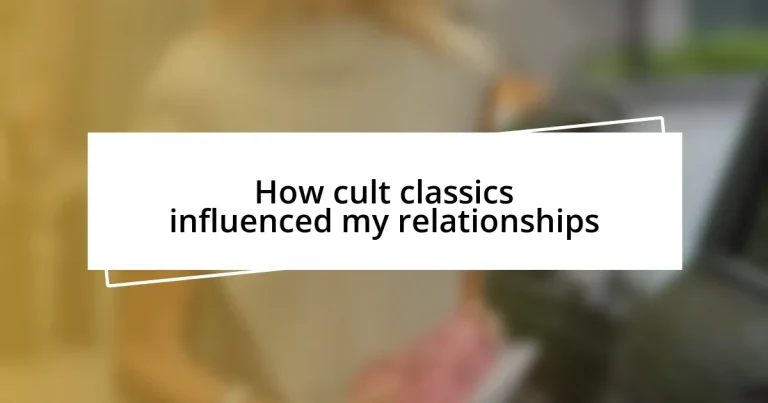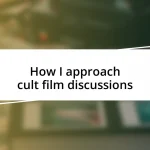Key takeaways:
- Cult classics foster deep connections and conversations among viewers, revealing aspects of identity and community.
- The themes explored in these films, such as identity and romantic relationships, resonate with personal experiences and influence friendships.
- Analyzing character relationships in cult classics mirrors our own friendships, prompting discussions about societal expectations and family dynamics.
- Everyday interactions and meaningful dialogues in relationships are as crucial as grand gestures, shaping trust and emotional growth.
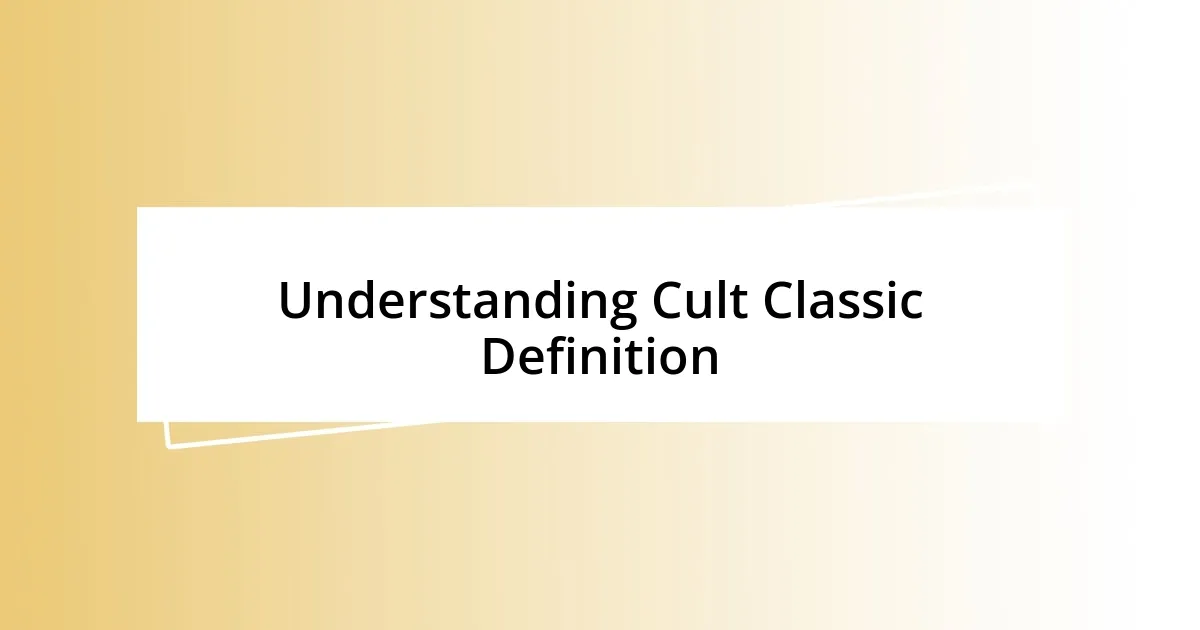
Understanding Cult Classic Definition
Cult classics are films or shows that have developed a dedicated and passionate fanbase over time, often despite being overlooked by mainstream audiences upon their initial release. I remember my first encounter with a cult classic—watching “The Rocky Horror Picture Show” with friends at a midnight screening. The energy in that theater, filled with people dressed as characters, made me feel a connection to a community that shared my love for something unique and underappreciated.
What truly defines a cult classic is its ability to resonate deeply with viewers, breaking conventional boundaries and sparking conversations that linger long after the credits roll. Have you ever laughed, cried, or found yourself quoting a line from a film that just seemed to understand you? Each viewing feels like a personal experience, creating lasting memories tied to the friendships that formed over those shared moments. This bond we develop with these films often reveals something about our identities and influences how we relate to others.
The charm of cult classics lies in their quirks and imperfections, making them feel more relatable and human. I still recall my first time watching “Donnie Darko”; its surreal narrative and complex themes stirred something within me. I started discussing the film with friends, which opened up avenues for deeper conversations about life, philosophy, and our shared experiences. Isn’t it fascinating how these films, often misunderstood, can spark such rich dialogues?
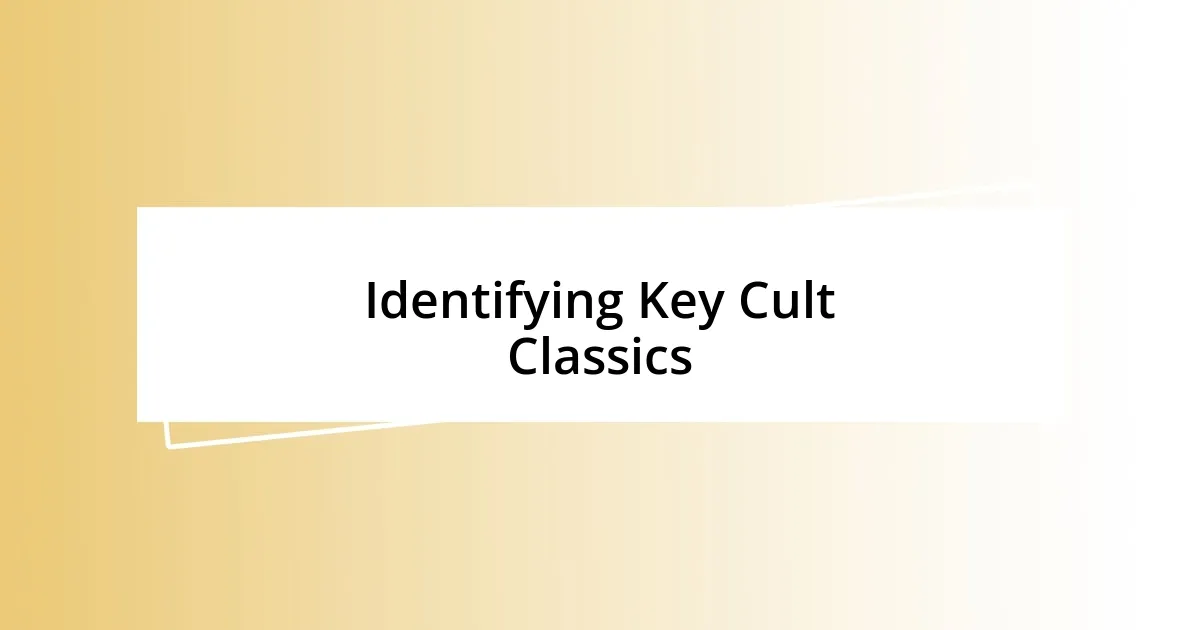
Identifying Key Cult Classics
Identifying key cult classics is fundamental to understanding their impact on our lives and relationships. When I think of titles like “The Big Lebowski” and “Fight Club,” I see more than just movies; I see shared moments with friends, laughs that bonded us, and eye-opening discussions that changed how I view the world. These films, with their unique narratives and eccentric characters, often reflect aspects of our personalities and social connections, making them memorable reference points in our conversations.
I’ve experienced firsthand how discussing cult classics, like “Pulp Fiction,” can unlock deeper connections with others. One night, while reminiscing over a pizza, my friend and I dove into the film’s nonlinear storytelling——it sparked an unexpected but intense debate about fate and choice in our own lives. Watching cult classics isn’t just about the films themselves; it’s about the stories we create around them and how they can strengthen our relationships in surprisingly profound ways.
The beauty of recognizing cult classics lies in their diversity. From heartwarming coming-of-age tales like “The Breakfast Club” to mind-bending thrillers like “Mulholland Drive,” each film reflects unique perspectives that invite personal interpretation. They speak to us in different ways, depending on our life experiences and the context in which we watch them. It’s a reminder of how our relationships with these films, and each other, deepen over time.
| Cult Classic | Impact on Relationships |
|---|---|
| The Big Lebowski | Shared laughs and laid-back vibes with friends. |
| Fight Club | Conversations about identity and societal expectations. |
| Pulp Fiction | Debates on fate and choice through its storytelling. |
| The Breakfast Club | Connection through shared experiences of adolescence. |
| Donnie Darko | Discussions about meaning and reality. |
| Rocky Horror Picture Show | Cultivated a sense of community and belonging. |
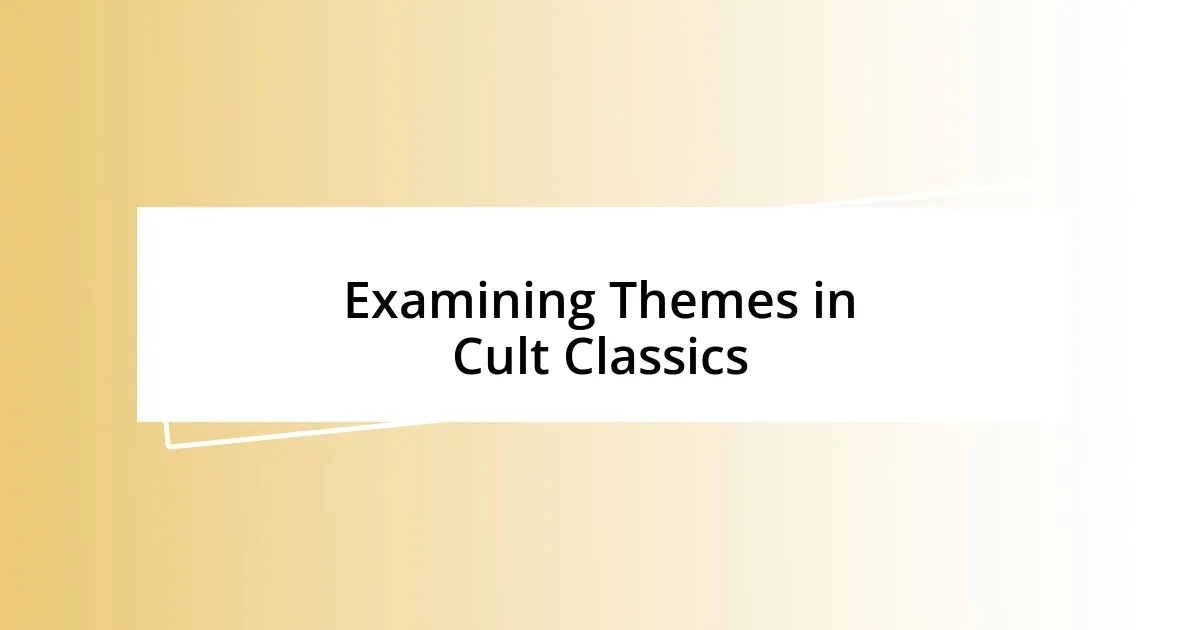
Examining Themes in Cult Classics
Exploring themes in cult classics offers a window into the core emotions and relationships we experience in life. I remember viewing “Heathers,” and the intensity of its dark humor struck me deeply. It made me reflect on the high school dynamics I navigated, and how friendships could be both supportive and toxic. It’s moments like these that demonstrate how these films resonate with personal experiences, influencing friendships and perceptions.
- Identity and Self-Expression: Many cult classics challenge societal norms, encouraging viewers to embrace who they truly are.
- Friendship Dynamics: Films like “The Goonies” highlight how adventure and loyalty can strengthen bonds among friends.
- Romantic Relationships: “Say Anything…” portrays the complexity of love, sparking discussions about romance and the expectations we build around it.
- Rebellion and Freedom: Titles such as “Ferris Bueller’s Day Off” inspire a sense of freedom, urging us to break away from routine and seek connection.
- Existential Themes: Movies like “The Labyrinth” and “Eternal Sunshine of the Spotless Mind” invite us to ponder our choices, relationships, and the fleeting nature of time.
I often find that the themes explored in these films create a sense of camaraderie among those who share similar views, leading to heartfelt discussions that extend beyond the screen. Each deep dive into a powerful narrative becomes a chance to connect on a level that transcends everyday conversations.
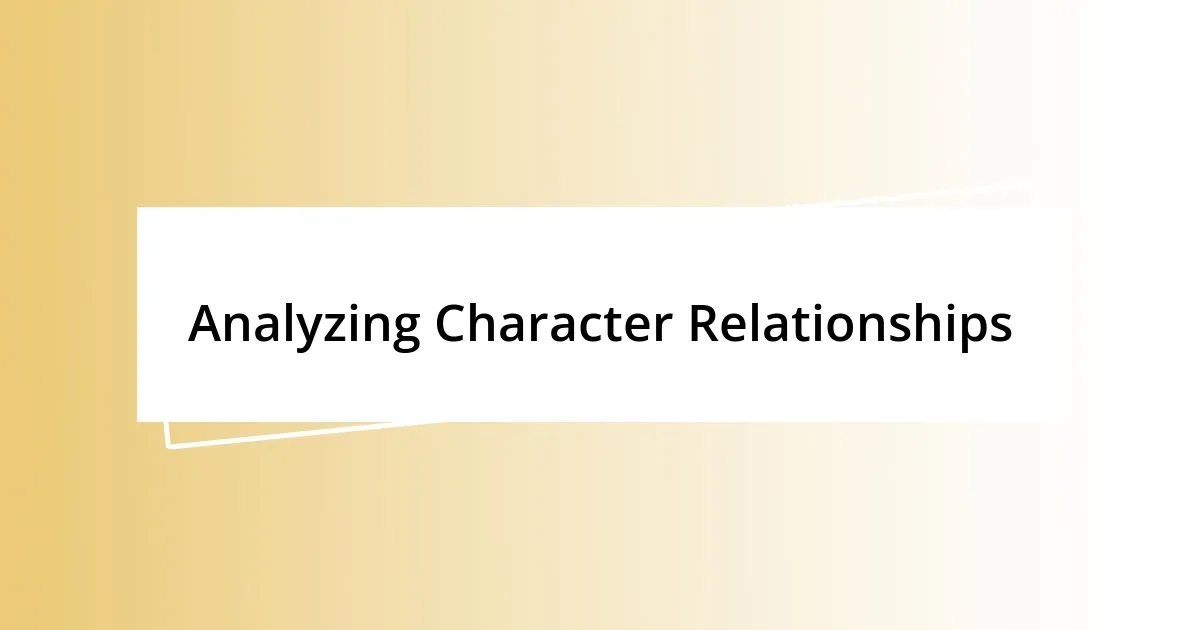
Analyzing Character Relationships
Delving into character relationships in cult classics can be like peeling back the layers of our own friendships. When I watched “The Graduate,” I couldn’t help but feel the tension between Benjamin and Mrs. Robinson. Their complex relationship sparked questions in my mind: How often do we find ourselves torn between desire and the expectations of society? I’ve had moments where I felt pulled in multiple directions, wrestling with my own choices, which makes me relate deeply to their dilemma.
Similarly, the bond between the characters in “The Royal Tenenbaums” highlights familial ties and the quirks that come with them. I remember talking about that film with my siblings; it became a mirror for our own family dynamics. Reflecting back, I found humor in the unique connections we share, yet also a profound appreciation for the challenges inherent in those relationships. It’s fascinating how art can propel meaningful discussions that create understanding and forgiveness within our circles.
Moreover, films like “The Breakfast Club” focus on how different personalities intermingle. I distinctly recall a late-night movie marathon where we analyzed the group’s chemistry. The thought of how misfits come together resonates with my experience of finding acceptance among diverse friends. Isn’t it remarkable how these characters, despite their differences, create a makeshift family? Engaging with these narratives not only entertains but deepens our empathy and connection with one another.
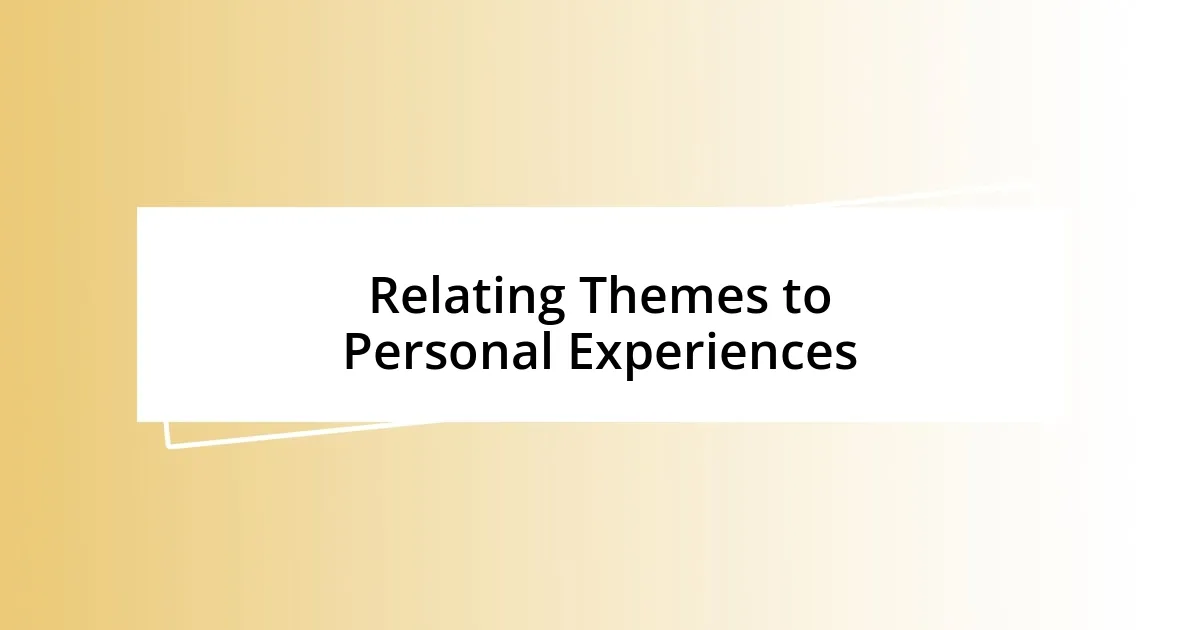
Relating Themes to Personal Experiences
Reflecting on the theme of identity in cult classics often prompts me to think about my own journey of self-discovery. Watching “The Breakfast Club” helped clarify that the struggle to fit in is universal. It reminded me of my high school days when awkwardness was the norm. How much are we shaped by the labels we bear? I realized that embracing my quirks, just as the characters did, allowed for genuine friendships to flourish.
Similarly, the bond showcased in “The Goonies” made me reminisce about my childhood adventures with friends. Those carefree moments—climbing trees, exploring woods, and searching for hidden treasures—created a foundation of loyalty that still resonates in my adult relationships. Do you remember those friends from your youth who felt like family? I always cherish how those experiences not only built trust but also taught me the value of shared adventures in deepening connections.
Movies like “Say Anything…” have sparked countless discussions about love and the weight of expectations with my partner. The iconic scene where Lloyd holds the boombox is a reminder of grand romantic gestures, but it also compels us to consider: What truly matters in love? I’ve found myself wanting to strike that balance between vulnerability and genuine expression, acknowledging that relationships are about both the epic moments and the quiet, meaningful exchanges. This delicate interplay has shaped how I approach romance in my daily life.
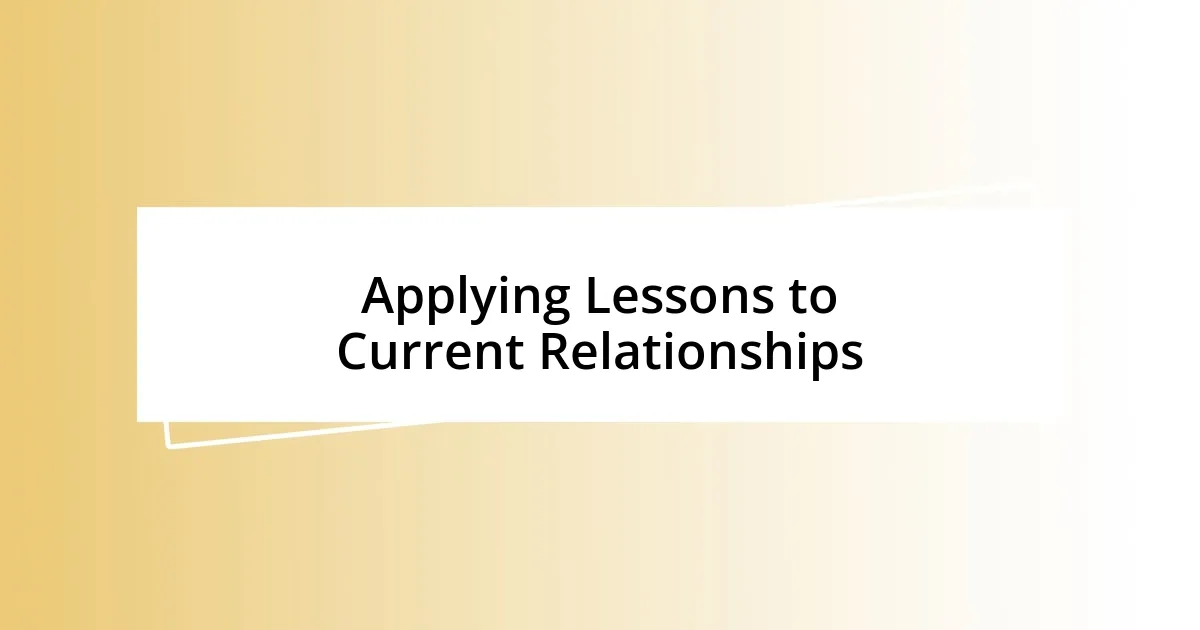
Applying Lessons to Current Relationships
Experiencing the emotional depth of characters can profoundly shape how we relate to others. For instance, when I watched “Eternal Sunshine of the Spotless Mind,” I was struck by how memory affects love. Have you ever tried to forget someone you once cherished? It reminded me of a breakup where I struggled with holding onto happy moments while grappling with the pain. This duality led me to appreciate emotional honesty in my own relationships, understanding that acknowledging both highs and lows is essential for growth.
In a different vein, “Clerks” taught me about the value of everyday conversations. While it’s easy to get caught up in grand gestures, I fondly recall times spent with friends just hanging out and chatting about life. Those seemingly mundane moments built a foundation of trust and comfort. I often ask myself: Are we making enough space for these simple exchanges in our busy lives? I’ve learned that prioritizing genuine interactions can strengthen bonds and foster deeper connections with loved ones.
I also find inspiration in “Before Sunrise,” where the focus is on meaningful dialogue and connection. Watching Jesse and Céline take their time to explore each other’s thoughts reminded me of a close friend I had deep conversations with during late-night drives. Do you remember those conversations that linger long after they end? Our exchanges allowed us to peel back the layers of our fears and dreams, reinforcing how crucial it is to invest time in truly understanding one another.






